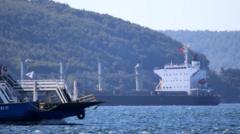Former UPS executive David Keeling’s nomination to lead the Occupational Safety and Health Administration (OSHA) is under scrutiny, particularly as the agency is poised to introduce new heat safety regulations affecting millions of workers.
Trump’s OSHA Nominee Faces Heat from Labor Advocates

Trump’s OSHA Nominee Faces Heat from Labor Advocates
David Keeling, nominated to head OSHA, has past ties to companies resisting heat regulation amid growing safety concerns for workers.
David Keeling, known for his extensive background at UPS and Amazon, is becoming a focal point in the ongoing debate over worker safety amid extreme heat. As President Trump’s nominee to direct OSHA, he is stepping into a role crucial for protecting health standards, just as the agency is contemplating regulations to safeguard workers in high-temperature environments.
UPS drivers have long raised alarms over the absence of air-conditioning in delivery trucks, with many alleging that Keeling’s leadership was ineffective in pushing for necessary reforms. These concerns are compounded by the imminent Senate committee vote regarding his confirmation that suggests a divided labor sentiment regarding his suitability for the position.
Labor unions reflect this division; the International Brotherhood of Teamsters has publicly endorsed Keeling, citing his extensive experience in health and safety, while some labor representatives and former UPS employees express skepticism about his commitment to enacting the heat protections critical for drivers and other workers subjected to extreme conditions. As the industry braces for a pivotal decision, advocates and drivers are left to question whether Keeling’s tenure will lead to progressive change or continued corporate resistance against essential safety measures.
UPS drivers have long raised alarms over the absence of air-conditioning in delivery trucks, with many alleging that Keeling’s leadership was ineffective in pushing for necessary reforms. These concerns are compounded by the imminent Senate committee vote regarding his confirmation that suggests a divided labor sentiment regarding his suitability for the position.
Labor unions reflect this division; the International Brotherhood of Teamsters has publicly endorsed Keeling, citing his extensive experience in health and safety, while some labor representatives and former UPS employees express skepticism about his commitment to enacting the heat protections critical for drivers and other workers subjected to extreme conditions. As the industry braces for a pivotal decision, advocates and drivers are left to question whether Keeling’s tenure will lead to progressive change or continued corporate resistance against essential safety measures.
















